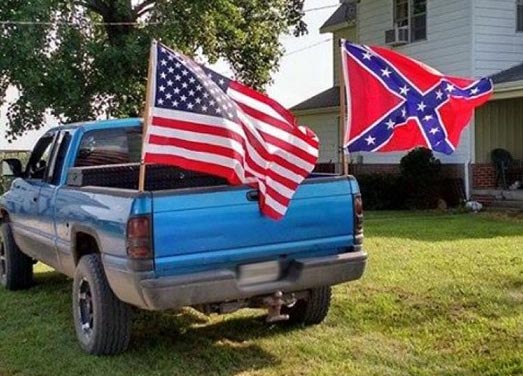A friend of mine witnessed an incident the other day. Some folks had car trouble and were stranded at a gas station. A man saw that they needed help, proceeded to go and fix their car for them, and then went on his way.
Aside from the all-around lovely moment of humanity, what she noticed was this: the family with the car trouble was African American. The man who fixed their car was driving a truck with a Trump bumper sticker. And a Confederate flag. So my friend wondered: did the man driving the truck recognize the cognitive dissonance of that moment?
I’m going to go ahead and vote “nah.” Because he’s probably a nice guy. And there are lots of “nice” people out there who don’t know they are racists.
There’s all kinds of racism.
Take, for instance, the overt racism of a giant pizza executive, dropping a racial expletive into a now-highly-publicized conference call. Whoops. Bad manners, bad PR. But Papa John doesn’t really care. America will be pissed for awhile and “boycott,” but eventually, the lure of that garlic butter will just be too enticing, and his bottom line won’t suffer. Even his “resignation” from the University of Louisville Board bears no real consequence. Besides, people who use such inflammatory remarks in a professional setting clearly do not care about other human beings, or their own public image. Self-declared racist. No shame.

Trouble is, it’s way too easy for the rest of the population to look at Papa John Schnatter and know beyond doubt that they are not that guy. They don’t use the N-word, they don’t walk around in a white hood with a burning cross … But. They might well be driving around with a Trump sticker and/or a Confederate Flag. And it’s all a matter of degrees.
Plenty of “nice people” are still racist in more subtle ways. They might help out a black family with car trouble, they might even “have black friends.” But that doesn’t mean they aren’t taking part, whether willfully or unknowingly, in deeply ingrained, systemic racism. This is an important nuance right now. On the one hand, decent people act shocked and appalled that a high-profile executive would use the N-word in polite company. And yet, they shake their heads and talk about “respect” and “civility” when an unarmed black kid is shot by a police officer. “If only those kids would learn some respect for authority … it’s all about being polite!”
People are horrified when a Starbucks manager (or anybody, really) calls the cops on a black person for just generally being around. “We’re better than this,” nice folks say. But we really aren’t better than this. This is who we are, and what America has always been.
And being “nice” won’t fix it.
You can be “nice” and still be part of the deeper issue. You can be nice and help somebody fix their car, while your own still bears the very emblem of servitude and white supremacy.
Broadly speaking, we put way too much value on “nice.” That which is pleasant, mannerly, clean, appropriate, unobtrusive … pick your adjective. We value it so much as a culture that we’ve even imposed a narrative of the “nice black person” on people of color. As in, the one that can fit into certain cultural norms of whiteness and get along in a world cultivated by and for white folks … Exhibit A, the Huxtables. Exhibit B … the Obamas.
Never in life will I try to speak to the lived experience of black Americans in this century. But I will refer you to We Were Eight Years in Power: An American Tragedy, by Ta Nehisi Coates. His work is critical reading for those who want to understand the history of racism in this country, and more importantly, how it still plagues us to this day. To be a white person in modern day America is to own a painful legacy of slavery, segregation and an ongoing imbalance of power and economy that is the result of generations of abuse. We all benefit from it, regardless of how nice we are.
There are many kinds of racists: there is, of course, the garden-variety, Klansman-in-a-hood kind of racist. Most Americans recognize this as heinous behavior.
Then there’s the drop-a-racial-slur-in-a-conference-call racist; and the marching-in-a-rally-with-torches-and-swastikas, “very fine people in Charlotte” kind of racist. I’m guessing a solid majority of Americans think that’s not OK.
Of course, you’ve got the kind of racist that is “nice,” but sports a confederate flag on his vehicle. “It’s not about hate, it’s about pride,” he says.
Then we have the subtle brand of racism that allows perfectly nice people to vote for Donald Trump; to turn a blind eye to his overt embrace of white supremacy because “he knows how to run a business,” or “I just didn’t like Hillary.” Empowering his brand of bigotry is its own kind of racism; and that is a good half of us right there.
And maybe, the trap we really need to watch out for is the kind of bias that simply denies racism’s reality—a willful ignorance of the systems and structures that built and continue to shape our culture. Refusing to accept the reality of that system is, in itself, a kind of racism. And if I were a real-life statistician and could give you numbers, my hunch is that a very large percentage of white Americans fall into this category.
I keep thinking of that part in Harry Potter when Sirius says, “The world isn’t split into good people and death eaters, Harry. We’ve all got both light and dark inside of us.” And ain’t it the truth. There are folks bearing Confederate flags on their vehicles who will extend acts of kindness towards people of color in ways we might find pleasantly surprising. There are also highly successful businessmen who will drop the N-word without a second thought. And there are kind, loving, compassionate people who prop up a toxic system every day by simply denying that system’s existence. It’s complicated. WE are complicated.
And we are also very nice. But let’s not confuse kindness for equality, or good manners for justice. Let’s not keep voting white supremacists into office and then wondering why racism is still a problem.












